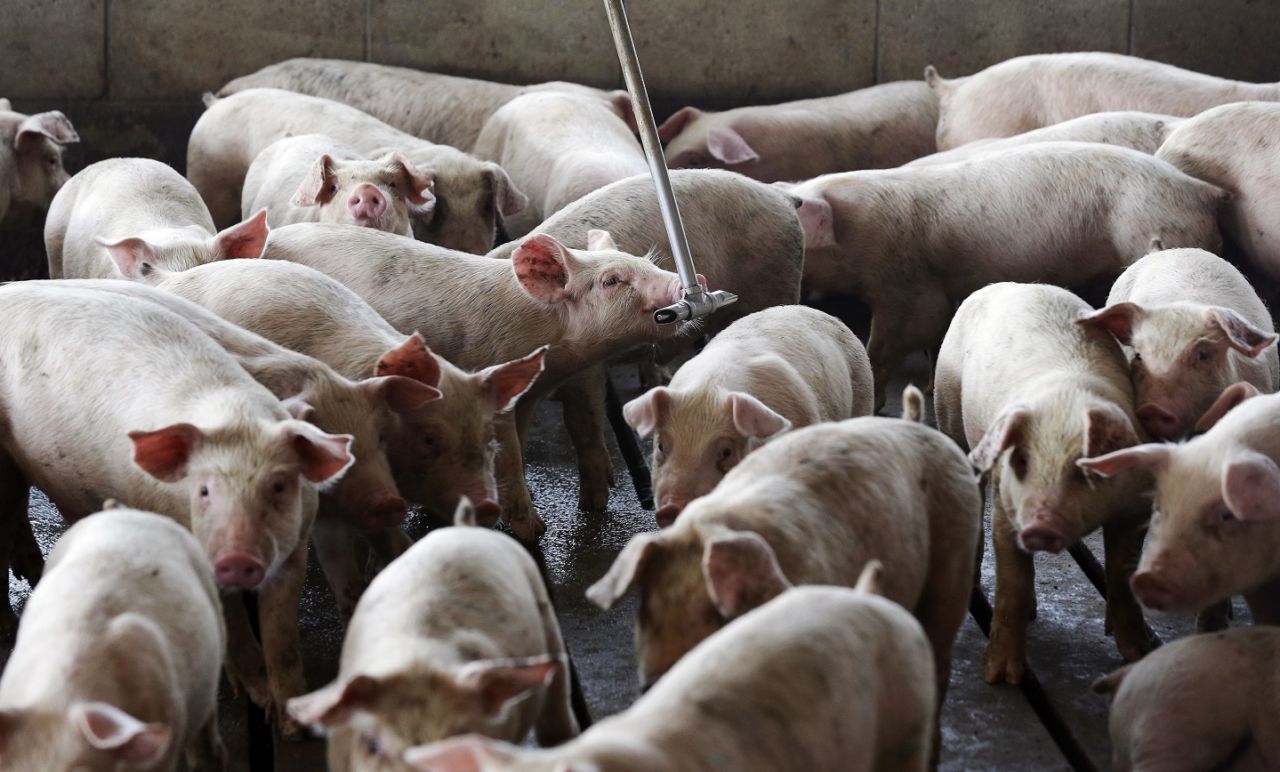Agriculture
“We are three weeks away from not having pork on the shelves.” -Worthington pork plant euthanizes 3,000 hogs per day

Relief and anxiety hit as President Donald Trump issued the Defense Production Act to order meat processing plants to remain open.
With horns honking outside from protestors, Minnesota 7th District Congressman Collin Peterson, Minnesota Gov. Tim Walz, 1st District Rep. Jim Hagedorn, Minnesota Agriculture Commissioner Thom Petersen, and Board of Animal Health State Veterinarian Beth Thompson delivered remarks in a hangar at the Worthington Municipal airport Wednesday afternoon.
“This part of the world, it is something we’re incredibly proud of that we feed the country,” Gov. Walz said. “We feed the world. It is a huge economic engine, but more than that it’s part of the culture of who we are.”
A woman at the press conference said the protestors were honking to voice concern for the safety of workers in meatpacking plants because COVID-19 quickly spread through the facilities.
“We are not going to support anything unless these workers are happy safe and comfortable back to work,” Congressman Peterson said.
The plants were shut down at that time to re-engineer the facilities and meet CDC guidelines for preventing spread of COVID-19. The changes included adding more shields and spacing out workers so they would not be standing shoulder to shoulder.
“We need to get these plants up and running,” Walz said. “We need to make sure our markets are functioning, and the only way we do that is to ensure worker safety. No executive order that I do or the president does is going to change the fact that that virus will infect you if we don’t do things right.”
Peterson admitted they would not be able to process 21,000 animals a day as the plant had before, but was hopeful for when the plants could reopen.
“I can tell you as chairman of the ag. committee, this is not going to happen again on my watch,” Peterson said. “We are going to have a way to respond to emergencies that’s on the shelf that we can take off whenever we have a situation.”
As the backlogs of hogs on farms grew, Peterson said he asked JBS to help euthanize animals that could not be processed. Peterson explained the farms had an efficient system for reproducing animals and providing them to a market. When the plants shut down, a backlog of hogs on farms grew. Farms ran out of space for the animals. Another problem is hogs that grow too big, above 300 pounds, cannot be processed in the facilities. Farmers started cutting rations, aborting pregnancies in sows, and killing piglets.
“The producers have been incredibly hit by this,” Walz said. “It’s not like things have been great agriculture pre-COVID-19, but now they’re horrific. Now, they’re facing a horrific of choice of trying to humanely dispose of these hogs.”
Around 160,000 hogs per day needed to be euthanized nationwide. They had hoped JBS could process 13,000 animals per day, but logistics limited the number to just 3,000.
“It is not as many hogs as we thought, but it is working,” Peterson said.
There are not enough trucks to haul the pigs and carcasses and there is limited space on the conveyor. The carcasses are being hauled to a rendering plant in Sioux City, Iowa. The initial idea was to dig 12-foot trenches by the landfill in Nobles County, but the water table is too high and could lead to contamination. Additionally, local landfills can handle a limited number of hog carcasses per day.
Composting the carcasses is another option, but it is an expensive answer in a situation where there are already financial losses.
Peterson added he is working with the USDA to receive financial resources to depopulate pigs, but it is an unprecedented issue. In the past, the USDA helped pay to eliminate diseased animals, but in this case, it is the workers, not the livestock, that are sick.
In recent weeks, industry officials reassured consumers there was not a meat shortage, but there could be limits on selection and price increases in the grocery store. Petersen was less optimistic.
“We’re about three weeks away from not having pork in the shelves and the grocery stores,” Peterson said. “Maybe that will wake people up that this is a bigger issue than just whether we’re going to go hungry or not. It is a national security issue.
Peterson was concerned about possible riots if food security hits the United States.







